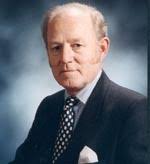Difference between revisions of "David Pulvertaft"
(Created page with "{{person |wikipedia= |amazon= |twitter= |image= |nationality= |birth_date= |birth_place= |death_date= |death_place= |constitutes=mariner }} '''Rear Admiral David Pulvertaft CB...") |
(unstub) |
||
| Line 3: | Line 3: | ||
|amazon= | |amazon= | ||
|twitter= | |twitter= | ||
| − | |image= | + | |image=David pulvertaft.jpg |
| − | |nationality= | + | |nationality=UK |
|birth_date= | |birth_date= | ||
|birth_place= | |birth_place= | ||
|death_date= | |death_date= | ||
|death_place= | |death_place= | ||
| − | |constitutes=mariner | + | |constitutes=mariner,officer, spook? |
}} | }} | ||
| − | '''Rear Admiral David Pulvertaft CB, FSNR''' was a Fellow of the [[Society for Nautical Research]] | + | '''Rear Admiral David Pulvertaft CB, FSNR''' is a British naval officer. In 1999, he was [[Defence Advisory Notice Secretary]], leader of the [[D-Notice|D-Notice Committee]], which gives 'advice' to British [[newspapers]], [[television]] and [[radio]] on what is allowed to be published in matters declared to be [[national security]]<ref>https://cryptome.org/jya/mi6-les.htm</ref>. |
| + | |||
| + | As of 2017, he was a Fellow of the [[Society for Nautical Research]]. | ||
| + | |||
| + | ==The arrest of Tony Geraghty== | ||
| + | In [[1998]], [[Tony Geraghty]], author and former [[Sunday Times]] defence correspondent, fell foul of the D-Notice secretary, for his book <i>The Irish War</i>. In the book Geraghty revealed tha two-thirds of the population in [[Northern Ireland]] were under sophisticated surveillance.<ref>https://www.theguardian.com/media/1999/jul/05/sundaytimes.mondaymediasection</ref> | ||
| + | |||
| + | Altough Pulvertaft denies having anything to do with Geraghty's arrest, Pulvertaft had suggested Geraghty submit the manuscript for vetting. Geraghty had declined such requests. His reason was partly to do with bad experiences of other writers who had subjected their work to the committee and partly because he was loath to do anything that might identify and jeopardise his sources. | ||
| + | |||
| + | The book went on sale to the public in the normal way. No attempt was made to impound it or to take action against its publisher. But in an early morning raid, the Ministry of Defence police agency sent five officers to Geraghty's home where they arrested him, impounded his computer files, notebooks, lists of contacts, and other items, including material for a new book, before charging him and a military officer with offences against [[national security]]. | ||
| + | |||
| + | |||
| + | |||
| + | |||
{{SMWDocs}} | {{SMWDocs}} | ||
==References== | ==References== | ||
{{reflist}} | {{reflist}} | ||
{{Stub}} | {{Stub}} | ||
Revision as of 08:08, 24 March 2021
(mariner, officer, spook?) | |
|---|---|
 | |
| Nationality | UK |
Rear Admiral David Pulvertaft CB, FSNR is a British naval officer. In 1999, he was Defence Advisory Notice Secretary, leader of the D-Notice Committee, which gives 'advice' to British newspapers, television and radio on what is allowed to be published in matters declared to be national security[1].
As of 2017, he was a Fellow of the Society for Nautical Research.
The arrest of Tony Geraghty
In 1998, Tony Geraghty, author and former Sunday Times defence correspondent, fell foul of the D-Notice secretary, for his book The Irish War. In the book Geraghty revealed tha two-thirds of the population in Northern Ireland were under sophisticated surveillance.[2]
Altough Pulvertaft denies having anything to do with Geraghty's arrest, Pulvertaft had suggested Geraghty submit the manuscript for vetting. Geraghty had declined such requests. His reason was partly to do with bad experiences of other writers who had subjected their work to the committee and partly because he was loath to do anything that might identify and jeopardise his sources.
The book went on sale to the public in the normal way. No attempt was made to impound it or to take action against its publisher. But in an early morning raid, the Ministry of Defence police agency sent five officers to Geraghty's home where they arrested him, impounded his computer files, notebooks, lists of contacts, and other items, including material for a new book, before charging him and a military officer with offences against national security.